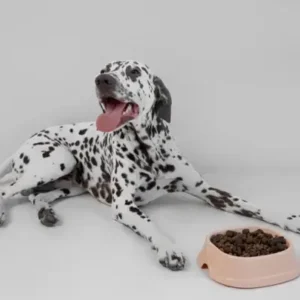Health Benefits of Popcorn for Dogs
If you decide to share some plain popcorn with your dog, there are a few health benefits:
- High in Fiber: Popcorn contains fiber, which helps maintain your dog’s digestive health.
- Low in Calories: Popcorn is low in calories, making it a good occasional snack for dogs on a diet or prone to obesity.
- Rich in Vitamins and Minerals: Popcorn provides essential vitamins (like B vitamins) and minerals (like iron), which benefit overall health.
Can Popcorn be Bad for Dogs?
While popcorn itself is not dangerous for dogs, there are a few potential risks to be aware of:
- Choking Hazard: Unpopped kernels can be a serious choking hazard for dogs, especially small breeds. Always make sure to give your dog fully popped popcorn and remove any unpopped kernels.
- Digestive Issues: Some dogs may have difficulty digesting popcorn. Eating too much can lead to gastrointestinal problems like gas, bloating, or diarrhea.
- Additives: Popcorn that contains butter, salt, or other flavorings can be harmful. Butter is high in fat, which could cause pancreatitis, while excessive salt can lead to sodium ion poisoning, especially if your dog consumes a large amount.
How Much Popcorn Your Dog Can Eat?
Plain, air-popped popcorn, packed with fiber, is a safe treat for dogs. Just be sure to avoid oils, butter, salts, sugars, or any other added ingredients. Always check for any unpopped kernels before offering popcorn to your pup.
Treats like popcorn should be given in moderation, and they should make up no more than 10% of your dog’s total diet. The remaining 90% should come from a balanced dog food.
Below is a general guideline for how much popcorn you can safely give your dog, depending on their size and dog breed:
| Breed Size | Portion Size | Examples |
| Extra-small dog (2-20 lbs) | 1-2 pieces | French Bulldog, Dachshund, Yorkshire Terrier, Shih Tzu, Chihuahua |
| Small dog (21-30 lbs) | 2-3 pieces | Cavalier King Charles Spaniel, Boston Terrier, Cocker Spaniel, Bichon Frise, Cockapoo |
| Medium dog (31-50 lbs) | 5-6 pieces | Siberian Husky, Bulldog, Shiba Inu, Border Collie, Catahoula Leopard Dog |
| Large dog (51-90 lbs) | Small handful | Doberman, Akita, Boxer, Samoyed, Dogo Argentino, Vizsla |
| Extra-large dog (91+ lbs) | Handful of pieces | Bernese Mountain Dog, Saint Bernard, Boerboel, Chinook |
How to Safely Give Popcorn to Your Dog
If you decide to treat your dog to some popcorn, here are a few safety tips:
- Plain, Air-Popped Popcorn Only: Avoid buttered, salted, or flavored popcorn. Make sure it’s plain, air-popped popcorn without any additives.
- Small Portions: Give only a few pieces at a time. Too much popcorn can lead to digestive issues.
- Monitor Your Dog: Keep an eye on your dog after they eat popcorn to watch for any adverse reactions, such as vomiting, diarrhea, or choking.
- Avoid Unpopped Kernels: Always remove any unpopped kernels before offering popcorn to your dog. These can cause choking or damage to their teeth.
Alternatives to Popcorn for Dogs
If you’re looking for healthier, safer alternatives to popcorn, here are a few great options:
- Carrot sticks: Dogs can eat carrots! They’re low in calories, high in vitamins, and great for dental health.
- Apple slices (without seeds): Dogs can eat apples (without seeds)! They’re rich in fiber and vitamins, making them a healthy snack.
- Sweet potato chews: Dogs can eat sweet potatoes! They aid digestion and support dental health.
- Broccoli: Dogs can eat broccoli! Packed with vitamins and fiber, serve in moderation to prevent digestive issues.
- Avocado: Dogs can eat avocado in moderation, but avoid the pit and skin. The flesh is safe in small amounts.
Popcorn should only be an occasional treat—stick to healthy, vet-approved snacks to keep your pup happy and healthy!








